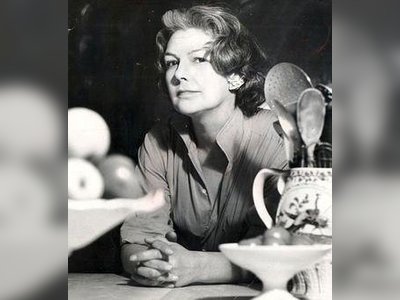British Heritage
Remember, Cherish, Learn.
beta
Egon Ronay
The Palate Behind Britain's Culinary Renaissance.
Egon Ronay, an eminent figure who forever reshaped Britain's relationship with food, was an authority that brought about a new gastronomic era to the UK. With his discerning palate and dedication to raising the standard of British cuisine, Ronay played a pivotal role in Britain's culinary renaissance. His uncompromising commitment to quality and transparency positioned him as a guardian of Britain's culinary heritage and the champion of the nation's gastronomic future.
Born on 24 July 1915, Egon Miklos Ronay spent his early years in Budapest, Austria-Hungary, born into a family renowned for its expertise in the restaurant business. The hospitality industry was woven into the fabric of his life from the outset, and it would continue to shape his professional trajectory in profound ways.
Ronay's life took an unexpected turn with the outbreak of World War II. Drafted into the Hungarian Army, he found himself amidst the tensions of war, far from his passion for food and fine dining. Following the end of the conflict, the new Communist regime seized his father's restaurant, prompting Ronay to leave Hungary and embark on a journey to the UK in 1946.
On his arrival in London, Ronay quickly delved into the city's culinary scene, managing Princes Restaurant in Piccadilly and the Carousel Club in St James's. His distinct flair for combining traditional dishes with innovative flavours caught the attention of influential figures, including the esteemed TV chef Fanny Cradock.
Ronay's venture into journalism started with a food column in The Daily Telegraph, paving the way for his lasting legacy: the influential Egon Ronay's Guides. His expertise soon extended beyond his restaurant's kitchen, reaching the heart of British households.
1957 marked a turning point in British culinary history with the publication of the first edition of Egon Ronay's Guide to British Eateries. Its unbiased, comprehensive reviews, independent of advertising or hospitality offerings, quickly became a trusted reference for food enthusiasts. The blue roundels in the windows of restaurants featured in the guides became coveted marks of distinction, symbols of outstanding culinary quality.
Ronay's Guides not only set the bar for restaurant and hotel reviews but also contributed significantly to elevating the quality of British cuisine, both in public establishments and within the household. His insistence on excellence and passion for flavourful, quality ingredients breathed new life into Britain's food culture.
Ronay's impact on British gastronomy extended beyond his critically acclaimed guides. He also worked as a food consultant for several establishments, including the pub chain J D Wetherspoon and the motorway service station company Welcome Break. He ensured that his exacting standards for quality cuisine reached even the most casual eateries.
Despite selling the rights to his guides in 1985, Ronay remained closely involved with their publication. He fought for and regained control of his namesake guides in 1997, ensuring their continued adherence to the principles of impartiality and quality that had established them as culinary benchmarks.
Personal Life and Lasting Influence
Ronay's influence continues to permeate the British food scene through his daughters. Edina Ronay, a former actress, became a successful fashion designer, while his daughter Esther carved out a career in the media industry, working as a BBC editor and independent documentary producer.
Egon Ronay passed away in his Berkshire home on 12 June 2010, but his legacy is far from forgotten. His name remains synonymous with quality cuisine and culinary expertise, a testament to his profound impact on Britain's gastronomic landscape.
Egon Ronay's contributions to British heritage are immeasurable. He introduced the country to new culinary standards, influenced the public's dining habits, and inspired a generation of chefs, critics, and food lovers. His dedication to quality and impartiality left a lasting imprint on British gastronomy, a legacy that continues to shape the nation's food culture.
Early Life and Journey to the UK
Born on 24 July 1915, Egon Miklos Ronay spent his early years in Budapest, Austria-Hungary, born into a family renowned for its expertise in the restaurant business. The hospitality industry was woven into the fabric of his life from the outset, and it would continue to shape his professional trajectory in profound ways.
Ronay's life took an unexpected turn with the outbreak of World War II. Drafted into the Hungarian Army, he found himself amidst the tensions of war, far from his passion for food and fine dining. Following the end of the conflict, the new Communist regime seized his father's restaurant, prompting Ronay to leave Hungary and embark on a journey to the UK in 1946.
An Unmistakable Mark on British Cuisine
On his arrival in London, Ronay quickly delved into the city's culinary scene, managing Princes Restaurant in Piccadilly and the Carousel Club in St James's. His distinct flair for combining traditional dishes with innovative flavours caught the attention of influential figures, including the esteemed TV chef Fanny Cradock.
Ronay's venture into journalism started with a food column in The Daily Telegraph, paving the way for his lasting legacy: the influential Egon Ronay's Guides. His expertise soon extended beyond his restaurant's kitchen, reaching the heart of British households.
The Egon Ronay's Guides
1957 marked a turning point in British culinary history with the publication of the first edition of Egon Ronay's Guide to British Eateries. Its unbiased, comprehensive reviews, independent of advertising or hospitality offerings, quickly became a trusted reference for food enthusiasts. The blue roundels in the windows of restaurants featured in the guides became coveted marks of distinction, symbols of outstanding culinary quality.
Ronay's Guides not only set the bar for restaurant and hotel reviews but also contributed significantly to elevating the quality of British cuisine, both in public establishments and within the household. His insistence on excellence and passion for flavourful, quality ingredients breathed new life into Britain's food culture.
The Legacy Continues
Ronay's impact on British gastronomy extended beyond his critically acclaimed guides. He also worked as a food consultant for several establishments, including the pub chain J D Wetherspoon and the motorway service station company Welcome Break. He ensured that his exacting standards for quality cuisine reached even the most casual eateries.
Despite selling the rights to his guides in 1985, Ronay remained closely involved with their publication. He fought for and regained control of his namesake guides in 1997, ensuring their continued adherence to the principles of impartiality and quality that had established them as culinary benchmarks.
Personal Life and Lasting Influence
Ronay's influence continues to permeate the British food scene through his daughters. Edina Ronay, a former actress, became a successful fashion designer, while his daughter Esther carved out a career in the media industry, working as a BBC editor and independent documentary producer.
Egon Ronay passed away in his Berkshire home on 12 June 2010, but his legacy is far from forgotten. His name remains synonymous with quality cuisine and culinary expertise, a testament to his profound impact on Britain's gastronomic landscape.
Egon Ronay's contributions to British heritage are immeasurable. He introduced the country to new culinary standards, influenced the public's dining habits, and inspired a generation of chefs, critics, and food lovers. His dedication to quality and impartiality left a lasting imprint on British gastronomy, a legacy that continues to shape the nation's food culture.
- Egon Ronayen.wikipedia.org


